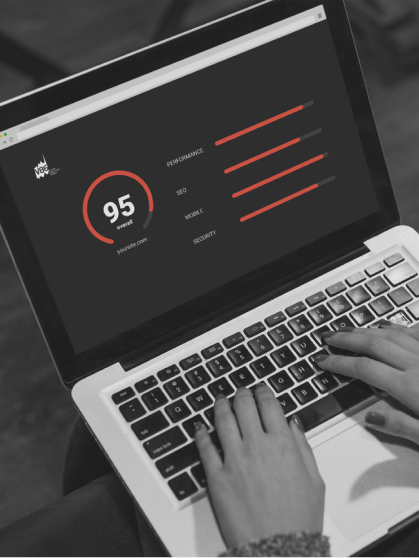How much does it cost to build a website?
A website is a vital sales asset for any business. Often, this is the first contact and impression a potential customer has of your company. So if it's unprofessional, does that reflect the attitude of your business?
While your website says a lot about you as a company when it comes down to actually building the website, the investment often comes down to one simple consideration — cost.
How much does it cost to build a website? What makes a cheap website cheap and why are some websites so expensive? Having worked on websites of varying costs we wanted to share some insights into these questions.
So, to help you budget for your new website we're breaking down the following:
- The 3 ways to complete a website project (DIY, using a freelance developer, and partnering with a web design agency).
- What things make up the cost of a new website (from hosting fees to copywriting), we also look at choices you can make to influence the price of your new website.
What are the different ways to build a new website?
DIY using free website platforms
The sheer number of free tools available for creating websites makes it hard to ignore this as an option. Free platforms have no up-front costs making them a much more viable option for some businesses, but they do require a large time investment.
If you're a new business starting out with a lot of time on your hands, this may be the option for you. Keep in mind that you need to build each page yourself using the templates provided. You may also have to upskill yourself in HTML and CSS to add or change features that haven’t been prebuilt into the templates.
If you are contemplating a DIY website, consider the following:
- Many of these platforms offer no technical support.
- They can require a lot of ongoing management and maintenance, which will fall to you.
- There can be minimal customisation options available.
- You can’t use your company domain without paying extra.
- The software branding will appear on your website.
Even with a DIY option, it is likely that you will begin spending money at some point. This is because these platforms put much of their most desirable features behind subscription services — such as removing their branding from your site and connecting your custom URL.
Engaging freelance web developers
The next step up is to seek out a freelance web developer. These people are relatively cheap and can build a website more tailored to your specifications. Many of these professionals charge an hourly rate and will be able to provide a quote based on the project outline.
A freelance web developer can offer several advantages, including:
- Experience in web design.
- Knowledge of user experience and common pitfalls.
- Providing other designs to draw inspiration from.
- Autonomous working, while you focus on your business.
But there are also a few common downsides, which you will need to navigate. These include:
- Cost overruns.
- ‘Cowboy’ builders that ghost a project.
- Miscommunication in desired outcomes and actual deliverables.
- Time delays in responses.
You will find that the more technical the website build, the more you will rely on their expertise for changes in the future. Carefully check which platform the developer uses and try and have them use something like WordPress so you can make basic changes with ease.
This approach is best suited to small websites with minimal functionality and only occasional ongoing support needs.
Partnering with a website design agency
The more advanced option has several positives and negatives, and won’t suit every web design project. This route is popular with large businesses that have relatively complex requirements.
It’s common to use a web design agency if you need:
- Your website to integrate with other platforms (CRM systems, ERP, and sales tools).
- A professional design to promote your business.
- SEO, search ranking, and lead generation implementation.
- Complex tools like calculators or interactive elements.
A web design agency is often the most expensive route but you get a lot of support from an organisation that bases its reputation on successful project delivery.
However, you'll want to ask the following questions before you engage with a web design agency:
- What CMS system do they use? This is important as you want it to be reliable, have stable ‘up time’, and be user-friendly if you plan on making updates yourself in future.
- What ongoing support will there be after the launch?
- What is their hourly rate for developer work and support?
- What is their service level agreement for support? I.e. how quickly will they respond to emails?
There you have the 3 different ways to go about a website project. But you may still be wondering what affects the price of a website — if so read on.
How much does a website cost and what affects the price?
A website is a crucial investment and can help your brand stand out from the competition. However, before you invest, you’ll want to know what is included in the price.
Let's take a look at the common factors that can drive the cost up or down.
How the number of website pages affects the price of a website
When quoting for website building, many agencies will determine the price according to how many pages the website has. This is because the more pages there are, the more work is required to get it up and running.
For those requiring 5 or 10 pages, there may even be a package deal, especially if the design of those pages is quite basic. For any extras, a good rule of thumb is to add about $100 per page above the standard package amount. Of course, these numbers are only an indication and will not accurately reflect the prices of every agency.
A website will typically need a minimum of 6 pages, for a bare-bones site. These pages will include:
- Home
- Contact us
- About us
- Services
- Privacy policy
- 404 error
If you want individual product pages, category pages, case study or testimonial pages, as well as a gallery or blog then the cost can go up quite quickly.
How complexity and functionality affect the cost of a website build
The cost of your website will depend on how you want it to perform and the various features that are required. The more complex the features are, the higher the cost will be. In saying that, the payoff of a streamlined, user-friendly interface will generally be worth the increased cost.
Website development includes setting up the navigation, Content Management System (CMS), and back-end coding. If done well, this should create an intuitive experience for users, with improved site speed, mobile-friendly functions, and streamlined usability.
For some businesses paying more for features like product configuration, e-commerce transactions, live chat, or image carousels will pay off by adding crucial value to the user experience.
When choosing website features you have to weigh up the cost of a feature versus the benefit. An online quoting tool may cost you tens of thousands to build, but what benefit will it bring in streamlining sales and offering customer pricing 24/7?
Host servers — why different website platforms cost different amounts
The platform used to host your website will have a direct impact on the cost and functionality of the end product. The price of having your website on one of these platforms will depend on several factors, including the location of the server, how secure it is, how reliable it is, and the type of websites it can support. For example, if you need an e-commerce site, check that the hosting platform is designed to support that type of site.
At Vanguard 86, we use HubSpot to host all of our website builds because it comes with:
- Excellent technical support.
- Integrated website reporting.
- Built-in SEO tools.
- Responsive design.
- SSL certification.
- Customisable user experience.
On top of that, HubSpot integrates seamlessly with other marketing, sales, and service tools to make the ideal all-in-one business hub.
The long-term management costs of a new website
When deciding which platform to build your website on, you will need to consider the ongoing costs of managing it and keeping it running smoothly.
If you opt for a cheaper hosting platform in the early stages, you will likely encounter time-intensive investments required later. You will be the one making updates and you’ll be responsible for learning how to improve the website to get better results. You may have successfully built a website, but do you know how to track visitors, convert more leads and get it ranking higher on Google?
On the other hand, if you build it on a well-integrated platform, the coding, design, and servers should be set up in a way that is relatively easy to maintain and you may even get pointers on what to change to improve its performance.
For example, if you build your website on a free platform, you will likely need to hire an agency to manage it after the launch, ultimately costing you more in the long run. In most cases, it will be more cost-effective to invest in a high-quality website upfront, with simpler management once it’s live.
How much do design, images, and graphics contribute to website costs?
When it comes to the visual appeal of a website, there is a lot of work that goes on behind the scenes. From a customer's perspective, a website with high-quality images, eye-catching design, captivating graphics, and recognisable branding are all influential factors in the buyer’s journey.
To prepare for the amount of design work needed, most agencies will incorporate in-house design into their quote. The overall cost of this will depend on the number of revisions, hours spent on it, and technical expertise.
They will have access to stock imagery if you need it and can create graphics specifically designed for websites that need to adjust from desktop screen sizes to mobile screen sizes. They’ll also know how to upload those images in the correct way to make your website fast and easy to use.
The copywriting costs of a new website
When setting up a new website, a lot of strategic work goes into the written content of each page, including the headings, calls to action, and other text elements. This copy is crafted carefully to attract and convert customers, communicate brand values, and promote products. It also helps your website appear in search engines when someone searches for a solution. This is called SEO.
If you want your new website to generate growth, don’t skimp on the copywriting. You can enlist the help of an experienced freelancer or an agency with in-house writers integrated into the process. Depending on the volume of copy, the experience of the writer, and the strategy behind it, the average cost of this can range anywhere from $25 to $25,000.
SSL certification — what is it and how much does it cost?
For your website to be reliable, safe, and consistent, you will need to ensure it has adequate security built in from the beginning. It is best practice to have an SSL certificate which is a digital file that encrypts data sent to your website’s server. This way customers can be confident that their personal information is safe.
An SSL certificate can cost anywhere from $5 to $300 per year, depending on the number of domains and required level of protection. Some website hosting platforms, like HubSpot, will include a free SSL certificate in their pricing.
How the number of revisions will impact the price of a new website
As with most services, the cost is determined by the amount of time spent to complete the job. In the case of web development and design, this will depend on the number of revisions required to get it to a level you are satisfied with.
To keep this cost low, we recommend that you communicate openly with everyone working on the project. The clearer you are about what you want, the easier it will be for everyone to get it right in the early stages. Start by stating the company’s target audience, brand values, tone, unique selling point, and budget. It can also help to give examples of other websites that you like.
In the later revision stages, focus more on minor edits like correcting typos rather than major design overhauls which will take things back to square one.
It is impossible to give a clear-cut price for a website without knowing the details, but the average price can range anywhere from $1,000 to $100,000. A basic 10-page website might cost closer to the lower end of the scale while a website with interactive tools, payment processing, large volumes of stock and complex integrations may cost closer to the upper limits of that range.
Whether a small business or a multi-national enterprise, it all comes down to the core elements mentioned above. It’s not just about building a website, but the ongoing maintenance and optimisation required to have it rank well and provide a return on investment.
We typically work on websites that cost between $12,000 and $34,000. These websites include:
- 30+ pages
- Forms integrated with your CRM
- Full design and copywriting
- Custom interactive elements, such as this map
- Full mobile design and development
- Complete search optimisation
- Resource library for downloadable content
- Image gallery or filtering media gallery
To find out how your website is performing, use our website grader. With the helpful insights it reveals, you can begin making improvements, from basic edits to a brand-new site. Or you can use it as a basis to discuss your needs with a web developer and unlock the full potential of a professional website.
Test your website using our free online grader
Enter your web address into our grading tool to see how you're performing in speed, performance, and useability.
Run the test




